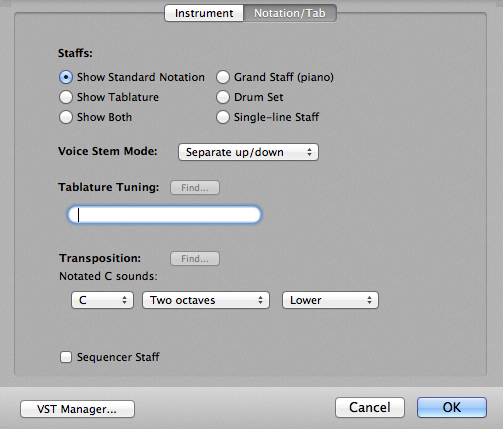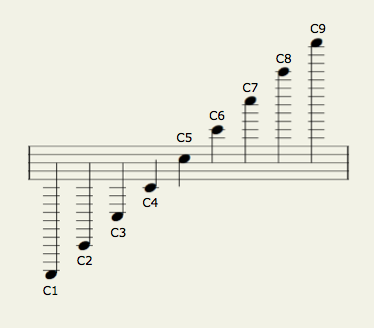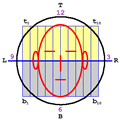Hello,
N3 does not produce this sound for the bass clarinet. Is this also the same with you? Yet it's actually part of it's register.
- It is currently Sat Apr 27, 2024 12:23 am • All times are UTC - 5 hours [ DST ]
Attention:
Welcome to the old forum. While it is no longer updated, there is a wealth of information here that you may search and learn from.
To partake in the current forum discussion, please visit https://forums.presonus.com
Bass clarinet
8 posts
• Page 1 of 1
Bass clarinet
- Attachments
-
- BasClaribet.JPG (19.47 KiB) Viewed 9062 times
I love Notion ! I love to compose !
Native langage french. Be patient with my English.
Native langage french. Be patient with my English.
-

Francois2010 - Posts: 271
- Joined: Fri Aug 06, 2010 8:35 am
- Location: Longueuil, Québec, Canada
Re: Bass clarinet
hi, for me too, but it is because bass clarinet have range for contra B (wikipedia). I dont know how it is in english or in world terminology. Say it easy, it is out of range.
- kvapka
- Posts: 84
- Joined: Tue Aug 09, 2011 3:23 pm
Re: Bass clarinet
Remember that the Bass Clarinet is notated in the same treble (G) clef as a soprano Bb clarinet, and it's transposed to 1 OCTAVE LOWER that the soprano clarinet. So the note you want is written a G two lines below the G cleff. You can go as low as an E below the 3rd additional line under the staff for all clarinets, and many bass clarinets have additional keys to reach D and C below that.
We clarinetists never, never read any clef other than treble.
We clarinetists never, never read any clef other than treble.
- elerouxx
- Posts: 328
- Joined: Thu Jun 16, 2011 6:45 pm
Re: Bass clarinet
Using the treble cleff is the French tradition. If you look at German scores, they use the bass cleff...
Bill Reed
Notion 4, Sibelius 7.5, Finale 2011/14, Overture 4, Cubase 7.5
Win8 x64, 32GB RAM
M-Audio ProFire 2626
Kontakt, VSL VI Pro, VE Pro, EWQL Orch, Choirs and Pianos
Notion 4, Sibelius 7.5, Finale 2011/14, Overture 4, Cubase 7.5
Win8 x64, 32GB RAM
M-Audio ProFire 2626
Kontakt, VSL VI Pro, VE Pro, EWQL Orch, Choirs and Pianos
-

wcreed51 - Posts: 754
- Joined: Wed Oct 07, 2009 10:50 am
- Location: Berkshires, MA USA
Re: Bass clarinet
Oh I didn't know that, thank you wcreed51.
Then, François, maybe the staff you are writing the note is set to transpose 1 octave lower, so the note is out of range. If you are going to use the bass clef, maybe you have to remove the octave lower transposition from the staff settings.
Then, François, maybe the staff you are writing the note is set to transpose 1 octave lower, so the note is out of range. If you are going to use the bass clef, maybe you have to remove the octave lower transposition from the staff settings.
- elerouxx
- Posts: 328
- Joined: Thu Jun 16, 2011 6:45 pm
Re: Bass clarinet
Looks like Notion uses a treble cleff...
Bill Reed
Notion 4, Sibelius 7.5, Finale 2011/14, Overture 4, Cubase 7.5
Win8 x64, 32GB RAM
M-Audio ProFire 2626
Kontakt, VSL VI Pro, VE Pro, EWQL Orch, Choirs and Pianos
Notion 4, Sibelius 7.5, Finale 2011/14, Overture 4, Cubase 7.5
Win8 x64, 32GB RAM
M-Audio ProFire 2626
Kontakt, VSL VI Pro, VE Pro, EWQL Orch, Choirs and Pianos
-

wcreed51 - Posts: 754
- Joined: Wed Oct 07, 2009 10:50 am
- Location: Berkshires, MA USA
Re: Bass clarinet
elerouxx wrote:We clarinetists never, never read any clef other than treble.
wcreed51 wrote:treble . . . is the French tradition.
These are interesting bits of information that I managed to miss over half a century ago!
I tried to play clarinet for about a year in elementary school, but (a) I kept getting blisters on my thumb and (b) I squeaked a lot; so I tried violin for a year, but it was worse and really squeaked; but then I discovered string bass, which was cool, except that the bass clef made absolutely no sense . . .
In retrospect, if someone had provided sheet music with the notes on a treble clef, then string bass would have made a lot more sense, because I knew the names of the notes and where they were located on string bass, but it all worked for the best, since I could play "by ear", and this soon led to getting work playing string bass in nightclubs, which for a 13 year-old was beyond awesome, and since I got the work through one of my friends who played piano; was 14 years-old; was married; had a house and car; read sheet music; and knew that I only understood treble clef but nevertheless knew all the notes on a piano, he played a bass note every once in a while to let me know when there was a weird chord coming up, which in toto was a bit surreal, but so what . . .
So what!
P. S. I do everything in NOTION 3 using treble clefs, and I set the octave used to play the notes via the staff setup preference or whatever it is called, where for example I set the treble clef for electric bass to play the notes two octaves lower, and I like this because here in the sound isolation studio there are only 12 notes and 8 or so octaves, which keeps everything vastly simple . . .

Treble Clef for Electric Bass ~ NOTION 3 Staff Settings, Notation Tab
And regarding the way to differentiate all the treble clefs, one way is to key on the name of the instrument, which works nicely when you know the range of each instrument, but another way is to append the correct scientific pitch notation integer to a big "C", where for the regular treble clef one can use "C4" to indicate that "Middle C" actually is C4, where in contrast for the treble clef of an electric bass, you might want to use "C2", noting that "Middle C" here in the sound isolation studio is the C which is the note with a single line just below the treble clef, and once you learn the notes several lines below and above the treble clef, you have a range spanning over four octaves, which is plenty of notes, really . . .
[NOTE: C0 is approximately 16.35-Hz, which is subsonic; and C9 is approximately 8372.0-Hz, which for all practical purposes is not so far from being supersonic, and when there is a properly tuned drumkit that has sizzled cymbals, playing the subsonic and supersonic stuff on other instruments tends to decrease overall sonic clarity, at least for DISCO and Pop songs, where the subsonic and supersonic stuff is handled differently, typically with carefully controlled synthesizers using various colors and flavors of noise . . . ]

Treble Clef Octaves in Scientific Pitch Notation ~ 8 Octaves Only
Really!
But the truly stellar aspect of NOTION 3 and staff transposition is that once you learn the notes from approximately C3 to C7, which basically requires learning the notes four or five lines below and above the treble clef, by configuring a treble clef to play notes one or two octaves lower or higher, you cover all the notes for most instruments, and at some point if you play grand piano then you can either (a) learn more notes or (b) switch to simple color-coding, where for example when a note is yellow, it is played an octave higher; when a note is white, it is played two octaves higher; but when a note is red it is played an octave lower; and when a note is blue, it is played two octaves lower . . .
The advantage of doing it this way is that it matches the most common musical instrument, which here in the sound isolation studio is a grand piano, where there is an additional rule, which is that every key has exactly one name, preferably where only sharps are used, because flats are strange . . .
Done this way, someone who is not a rocket scientist actually can do a logical mapping of keys on a grand piano to notes expressed in music notation . . .
Using an analogy, metaphor, or simile, the way having a virtual festival of clefs with special definitions works is like having the standard alphabet and a standard dictionary of words but when someone decides to start composing or reading poetry, they have to use a shifted alphabet and a shifted dictionary, where instead of writing and reading, "A rose by any other name would smell as sweet", they have to deal with "C tqug d(z+1) cp(z+1) qvjgt pcog yqwnf uognn cu uyggv" or something equally cryptic . . .
It probably made sense when everyone was writing music with feathers, ink, and parchment, or whatever, but we have computers and inkjet printers at the dawn of the early-21st century, and we also know a little more about acoustic physics, really . . .
Really!
-

Surfwhammy - Posts: 1137
- Joined: Thu Oct 14, 2010 4:45 am
Re: Bass clarinet
Yeah, of course we could completely redesign music writing, as well as the english language and all languages on earth, but it would be more realistic to use our short lives to write music.
Something that makes some sense is that, being the Clarinet a modern instrument if compared to the flute or harp, and even more because the practical extension of the instrument developed in relatively recent times, it's only written in G clef, always, despite its big range of notes. While other instrumentists of 'older' instruments like bassoon or violoncello have to deal with C and F clefs, us clarinetists only need to learn the G clef including 4 extra lines above and below the staff.
Something that makes some sense is that, being the Clarinet a modern instrument if compared to the flute or harp, and even more because the practical extension of the instrument developed in relatively recent times, it's only written in G clef, always, despite its big range of notes. While other instrumentists of 'older' instruments like bassoon or violoncello have to deal with C and F clefs, us clarinetists only need to learn the G clef including 4 extra lines above and below the staff.
- elerouxx
- Posts: 328
- Joined: Thu Jun 16, 2011 6:45 pm
8 posts
• Page 1 of 1
Who is online
Users browsing this forum: No registered users and 75 guests